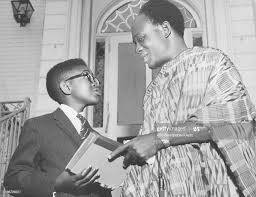**The Day Kwame Nkrumah Met a Young JJ Rawlings and Others at Achimota School**
In the annals of Ghana’s history, few moments stand out as profoundly symbolic of the country’s enduring political legacy as the day Kwame Nkrumah, Ghana’s first President, met a young Jerry John Rawlings and other promising students at Achimota School. This rare and memorable encounter has often been recounted as a fascinating intersection of Ghana’s political past, present, and future, as it brought together two figures whose leadership would significantly shape the country’s trajectory.
### **Achimota School: The Cradle of Excellence**
Achimota School, founded in 1927, has long been a beacon of educational excellence in Ghana. Known for producing some of the country’s most prominent leaders, intellectuals, and cultural icons, the school has played a pivotal role in shaping the nation’s human capital. By the 1960s, Achimota had earned a reputation as the hub of intellectual discourse, grooming students to become future leaders of the newly independent Ghana.
It was against this backdrop that Kwame Nkrumah, then the charismatic and visionary leader of Ghana, visited Achimota School to interact with its students. Nkrumah’s visit was part of his broader agenda to inspire the youth to take ownership of Ghana’s destiny as the first African country to achieve independence from colonial rule in 1957.
### **A Meeting of Generations**
During his visit, Nkrumah delivered a stirring speech to the assembled students and faculty, emphasizing the importance of education, discipline, and patriotism in nation-building. As he moved through the crowd, he engaged directly with students, encouraging them to pursue excellence and contribute to the country’s development.
Among the students present that day was a young Jerry John Rawlings, who would later become one of Ghana’s most influential and controversial leaders. At the time, Rawlings was a bright and curious boy, known for his adventurous spirit and charismatic personality. Though Rawlings was not yet involved in politics, the encounter with Nkrumah reportedly left a lasting impression on him.
Nkrumah’s message of African unity, self-reliance, and social justice resonated deeply with the students, including Rawlings. For many, the encounter served as a powerful reminder of the responsibilities that came with Ghana’s newfound independence and the sacrifices required to sustain it.
### **The Significance of the Encounter**
While the meeting between Nkrumah and Rawlings was brief, its symbolic significance cannot be overstated. Nkrumah, the elder statesman, represented the aspirations of a newly independent Africa—freedom from colonial oppression, economic self-sufficiency, and a united continent. Rawlings, on the other hand, symbolized the next generation of Ghanaians tasked with navigating the challenges of post-independence governance and development.
Decades later, Rawlings would rise to prominence as a military leader and statesman, leading Ghana through a tumultuous period of coups, economic reforms, and democratic transition. In his public addresses, Rawlings often echoed themes of social justice, accountability, and anti-corruption, ideals that bore striking similarities to Nkrumah’s vision for Ghana.
### **Other Students Who Were Present**
Nkrumah’s visit to Achimota School also brought him into contact with other students who would go on to make significant contributions to Ghana’s development. Some of these young minds would become influential academics, politicians, and public servants, helping to shape the country’s institutions and policies.
This moment of interaction between Nkrumah and the future leaders of Ghana serves as a reminder of the power of mentorship and inspiration in nurturing leadership. By engaging with students at Achimota, Nkrumah planted seeds of patriotism and ambition that would germinate in the decades to come.
### **Lessons for Today’s Leaders**
The encounter between Nkrumah and Rawlings at Achimota School holds valuable lessons for contemporary leaders and educators. It underscores the importance of investing in the youth, not just through education but also by inspiring them with a vision for the future. Leaders must actively engage with the younger generation, sharing their experiences and instilling in them the values of integrity, hard work, and service to the nation.
In a country where the youth make up a significant portion of the population, their empowerment and involvement in national development are crucial. Nkrumah’s example of engaging directly with students serves as a blueprint for fostering the kind of leadership that Ghana and the African continent need.
### **A Legacy of Leadership**
Today, both Kwame Nkrumah and Jerry John Rawlings are remembered as towering figures in Ghana’s history. Nkrumah, celebrated as the father of African independence, left a legacy of bold vision and unmatched determination. Rawlings, known for his populist appeal and drive for accountability, reshaped Ghana’s political landscape, transitioning the country to a stable democracy.
The day the two met at Achimota School remains a poignant reminder of how leadership and inspiration transcend generations. It was a moment where the past and the future of Ghana converged, paving the way for the country’s ongoing journey toward progress and development.
### **Conclusion**
Kwame Nkrumah’s visit to Achimota School and his interaction with a young Jerry John Rawlings is a story that encapsulates Ghana’s history and aspirations. It highlights the importance of mentorship, the enduring power of visionary leadership, and the role of education in shaping the future.
As Ghana continues to navigate its challenges, the legacy of that encounter at Achimota serves as a beacon, reminding leaders and citizens alike of the need to inspire, empower, and prepare the next generation to carry the torch of progress forward.



No comments yet
Be the first to share your thoughts!